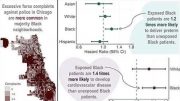During the first year of the COVID-19 epidemic, physician mental health care visits increased by 27%.
According to research published in JAMA Network Open, annual rates of outpatient visits for mental health and drug use among Ontario physicians increased by 27% during the first year of the COVID-19 epidemic. During the first year of the COVID-19 epidemic, there were 1,038 visits per 1,000 physicians, up from 817 the year before.
In the year before the epidemic, physicians made 26,266 mental health visits, compared to 31,936 in the first year of the pandemic.
The share of medical appointments linked to mental health has also increased. Prior to the pandemic, mental health appointments accounted for 23% of all outpatient visits. This rose to 28.3% in the first five months of the epidemic but fell to 23% in the next seven months while all-cause visits increased.
During the epidemic, physicians, like other healthcare employees, were subjected to huge work-related pressures. These included a higher risk of COVID-19 exposure, anxiety about infecting their friends, family, and coworkers, and demanding workloads.
«During the COVID-19 pandemic, medical surveys revealed an increase in depression, anxiety, and burnout. However, because these surveys usually only cover a single period of time and have a low response rate, it’s unclear how representative they are of physician mental health in general «Dr. Daniel Myran, lead author and postdoctoral fellow at the University of Ottawa Department of Family Medicine and The Ottawa Hospital, is a family physician, public health and preventive medicine specialist.
«We looked at changes in physician health care visits over time to help understand how COVID-19 has impacted physician mental health.»
Dr. Myran and his colleagues used ICES’ health administrative databases to match anonymized data from 34,000 practicing physicians in Ontario. They looked at all outpatient visits to a psychiatrist or primary care physician that were identified as being connected to mental health or substance use, both in person and via virtual care.
The findings of the study imply that the epidemic has put significant pressure on physicians’ mental health. «We discovered a significant rise in physician mental health visits during the first year of the COVID-19 epidemic, raising legitimate concerns about worsening physician mental health,» Dr. Myran added. «We discovered that during the epidemic, more physicians sought mental health care and that those who sought therapy did so more frequently.»
«Because physician mental health is a delicate subject, ensuring physician anonymity was an important aspect of this groundbreaking study. A specialized team ensured that all physician data were anonymous and that no individual physician could be identified «Dr. Peter Tanuseputro, co-senior author and assistant professor at the University of Ottawa’s Department of Medicine, is a physician-scientist at The Ottawa Hospital, ICES, and the Bruyère Research Institute.
There were no significant variations in the number of mental health visits between men and women, older and younger physicians, urban and rural physicians, or physicians who directly cared for COVID-19 patients in the emergency department or admitted to hospital against those who did not.
«We were surprised to see no difference in mental health visits by physicians who provided direct care to COVID-19 patients in hospital,» said co-senior author Dr. Manish Sood, a physician-scientist and Jindal Research Chair for the Prevention of Kidney Disease at The Ottawa Hospital, as well as an associate professor at the University of Ottawa.
«We did discover that prior to the pandemic, this group of doctors, which comprised specialists in critical care, emergency medicine, and internal medicine, had lower rates of mental health visits. This could indicate that they are more resilient, have a higher reluctance to seek help or have job schedules that prevent them from obtaining help.
However, it’s worth noting that our research only looked at the first year of the pandemic, and the situation has since shifted, especially with the omicron form now putting enormous strain on the healthcare system.»
The researchers speculate that the growth of virtual treatment alternatives during the epidemic may have contributed to an increase in physician mental health visits.
«When it comes to mental health and getting care, there is a lot of stigma in the medical field,» Dr. Tanuseputro explains. «It’s possible that virtual appointments lowered some of these barriers because they fit into a physician’s schedule more easily and were less noticeable to their peers.»
When the research team looked at the approximately 50,000 visits included in the study, they discovered some general patterns about mental health visits by physicians, in addition to insights into the COVID-19 pandemic.
First, compared to male physicians, female physicians reported greater rates of mental health visits (1,059 per 1,000 physicians vs. 596 per 1,000 physicians), which is similar to what is seen in the general community.
Second, some specializations had a much higher number of mental health visits than others. Psychiatrists, for example, had the highest yearly visit rate of 3,442 per 1,000 physicians, while surgeons had the lowest visit rate of 370 per 1,000 physicians.
«Physicians are not all created equal, and different specialties face distinct demands and realities. The disparities we observed between specialties could be explained by specialty-specific attitudes toward mental health treatment «Dr. Sood stated.
«Previous research has found that many psychiatrists attend therapy on a regular basis for both personal and professional reasons, while other research has found that surgeons are less likely to seek mental health care due to stigma. These findings point to the continuing need to de-stigmatize physician mental health and urge doctors to seek help when they need it.»
«While the epidemic may have worsened physician mental health problems,» Dr. Myran stated, «our analysis reveals that many of these concerns precede the pandemic.» «Mental health interventions for physicians in the future should focus on both COVID-19-specific stresses and pre-pandemic variables, many of which may require system-level adjustments and reinvestment in the healthcare system,» says the report.
«Long before the pandemic, physicians were feeling burnout due to overcrowded and under-resourced health systems,» says Dr. Katharine Smart, President of the Canadian Medical Association. «The impact of the pandemic on an already overworked physician workforce is demonstrated in this study.
When we talk about health system capacity, we frequently refer to people—physicians, nurses, and a variety of other health care providers who look after us all. As we manage future waves of the pandemic and build for a post-pandemic health system, we must prioritize their health and well-being.»






Be the first to comment on "During the first year of the COVID-19 epidemic, physician mental health care…"